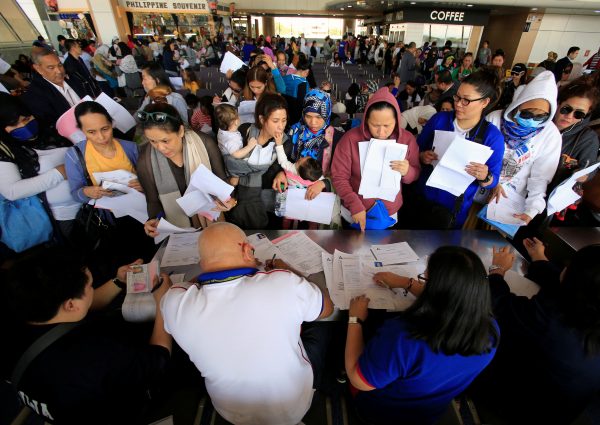The issue of how the bilateral labour agreement signed between the Philippines and Kuwait is being implemented to ensure the welfare and safety of about 260,000 Filipinos living in Kuwait — the majority of whom household workers — needs to be urgently addressed.
The Philippines’ 2018 attempted rescue of some Filipino domestic workers in Kuwait following news of Demafelis’ death embarrassed the Kuwaiti government. A diplomatic crisis ensued when then Philippine ambassador to Kuwait Renato Villa was declared persona non-grata by the Kuwaiti government and given a week to leave.
This decision was met with outrage from Philippine officials, as the two countries were negotiating the end of the first travel ban at the time. The diplomatic row led Filipino workers to worry about their jobs on top of the possible mistreatment by Kuwaiti employers. Household workers — who make up over 50 per cent of these labourers — were among the most at-risk.
The deployment bans of Overseas Filipino Workers (OFWs) to Kuwait indicate that the Duterte government is trying to take the murders of the two Filipino household workers and other cases of abuse against Filipino workers seriously. It sends a message to the Kuwaiti government calling for stronger measures to protect Filipino workers. But the bans fail to address the mistreatment of workers and instead opens the possibility of Filipino workers resorting to unregulated and unsafe channels to enter Kuwait.
The bans aim to emphasise the crucial role of Filipino workers by putting Kuwaiti employers in a disadvantaged position. But compared to other nationalities, Filipino workers are more expensive. Sourcing workers from elsewhere may reduce the burden of the Philippine deployment ban on Kuwaiti employers, but the quality of labour may also fall. Shortly after the second ban was imposed, Kuwait began negotiating an arrangement with Ethiopia as a better alternative source of domestic workers.
Compared to other types of workers, household workers are especially vulnerable to abuse because they are confined to their employers’ homes, away from regular monitoring by their agencies and Philippine missions. This practice stems from the ‘kafala system’ of sponsorship that allows employers to keep the workers’ passports and prohibit them from leaving or changing jobs without their employers’ permission.
The overall deployment trend to the region since mid-1970s reflects the feminisation of labour on the part of the Philippines. The majority of household labourers are women seeking to provide for their children left under the care of relatives in the Philippines. For some women, working as a household labourer abroad is the only way to escape poverty or violence at home, despite their vulnerability to abuse overseas.
The latest ban however has now resulted in an agreed harmonised template contract for OFWs as specified in a 2018 labour provision, which allows Filipinos to keep their passports and phones as well as a day off with pay and clearly indicated rest hours.
The treatment of Filipino workers in Kuwait has reflected a broader pattern of treatment of the almost two million OFWs in the Middle East. This indicates an urgency to review the Philippines’ labour migration law. Despite the Migrant Workers and Overseas Filipinos Act of 1995 (Republic Act 8042) and its amended version, Republic Act 10022, the Middle East remains a region with few safeguards to protect the rights and welfare of foreign household workers. There has been a clear lack of effective policy to address the compounding socioeconomic issues that Filipino workers have faced for many decades.
Sending Filipino workers overseas originally emerged as a temporary measure to ease unemployment at home during the mid-1970s. It has now become normalised, while initiatives to create job opportunities in far-flung areas of the Philippines proceed at snail’s pace.
The remittances from the more than 10 per cent of the Philippine population living abroad keep the Philippine economy afloat. But these remittances have discouraged the country from diversifying into other sectors such as agriculture, marine resources and manufacturing. The economy remains heavily dependent on a single source of revenue — labour exports. Although remittances from the Middle East are much smaller than the amount generated from the United States, Europe and Australia, the region still hosts the highest percentage of OFWs at 20 per cent.
The contribution of OFWs to the Philippine economy demands reciprocity from the Philippine government to ensure the protection of their welfare. The tacit notion that Filipino labour migration is simply part of a global trend, and that working abroad is the sole option for many Filipinos seeking better economic opportunities, should be seriously deliberated in the legislative and executive branches of the government. Policy proposal should entail the Philippines continuing to send workers abroad to benefit from their remittances, while also investing in infrastructure at home to create jobs for future generations of Filipinos.
Henelito A Sevilla Jr is Assistant Professor at the University of the Philippines Diliman.

